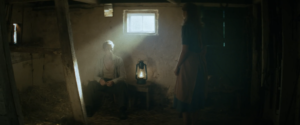
Critical Analysis - “ The Irrepressible”
(director - Stefan Köhler Pellegrini)
How should we think about the Morality of War? And the choices of those involved either voluntarily or involuntarily. The choices of the victims drawn into an unjust war. Is there such a thing as a “just” war? In the Stanford Encyclopedia of Philosophy we read that the justified war might well be a chimera. According to Just War Theory, one of the reasons for a war to be legitimate is, to use a more broad definition, to fight in order to right a wrong. And although during a just war, desertion can be considered an act of cowardliness and treason, on the contrary, during an unjust war desertion should and must be considered as an act of heroism.

In this, based on true events period short film set during the end of World War Two, young, German deserter Otto, chooses to escape the Wehrmacht troops, leaving behind an irrational war motivated by a far-right, totalitarian, fascistic political ideology. To do so he kills in self defense.
He then finds refuge in a country farm where he meets Ingrid, a young lady tired of her boring countryside existence, who dreams about traveling far away. With their father deceased Ingrid and her little sister Agnete decide to keep Otto hidden from danger and from their, exhausted by hardships, mother, who they feel would not approve such an action.

The overall production design is next to flawless. There is no need to elaborate on this further. Suffice it to say that sets, costumes, sound design, camera work, mise-en-scene, all create a memorable aesthetic experience, a “true Illusion” as I often tend to use this term in order to describe perfection.

Film director Stephan Pellegrini establishes a firm setup as he unfolds the complexities of the characters involved in his story, their confrontational relationships, the situations in which they all are, and of course the dominant problems faced by the two main characters, both of who are involuntary exponents of what Leo Tolstoy says in “War and Peace” namely that “if no one fought except on his own conviction, there would be no wars”. Otto’s struggle with a past he wants to leave behind once and for all and the uncertain future which fills him with insecurity and fear, as well as Ingrid’s amaranthine thirst to break all bonds with her oppressive everydayness and escape to “a journey of an eternal quest”.
The narrative is powered by this exquisite hermeneutical ensemble used by Pellegrini to intensify all complications and tensions and eventually resolve them by combining crisis and catharsis in a climatic way that is both emotionally satisfying and resolute.

On the weaker side we have on the one hand a slow narrative pace, as we often feel that we are watching a 20 minute film trapped in the body of a 30 minute movie, and on the other the story’s lack of originality.
Every story has a right to be told. Especially the true stories, that have an extra layer of believability and awe and the potential to be extremely inspiring, let alone a story set in WWII. We all stand with repulsion toward the nazi’s monstrosities and the horrors of that period and with the greatest respect and in eternal mourning for the millions of the innocent victims, with our big moral debt being Not To Forget.

“The Irrepressible” is a moving story with a propitious ending, similar to a great number of stories we have been told by our grandfathers or seen on the screen. As stated, being not an original story itself and one that does not bear the impact of a particularly distinctive situation as the story of German industrialist Oskar Schindler or the Polish pianist Władysław Szpilman, creator Pellegrini could have chosen a more evocative narrative approach (which we are certain he could deliver easily), rather than a “safe”, academic one thus depriving the film a necessary degree of uniqueness, a very important element especially for films of the specific genre.
Is this a lesser film because of this? The answer is “no”. Pellegrini’s directorial seriousness and intensity stimulated and utilized the creativity of all team members, and by keeping it simple he successfully served the film’s artistic and moral intentions. Was there room for improvement? Maybe. But this is an ascertainment so complex and multilayered as Heidegger’s work “The Origin of the Work of Art” itself.
Besides, let's keep in mind that some diamonds are only perfect due to their slight imperfections.

Carrying echoes of other WWII movies “The Irrepressible” is a wonderful short film, strong as well as tender taking the viewer on a powerful journey from the very beginning making it impossible for anyone to remain unmoved.
Kiriakos Kotsinis
BSc, MA



